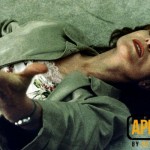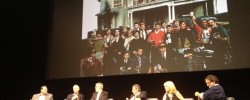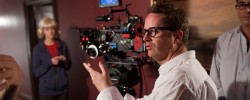
Review: The Wall (2012) - Essential Viewing

Cast: Martina Gedeck
Director: Julian Pölsler
Country: Austria | Germany
Genre: Drama | Fantasy
Official Trailer: Here
Editor’s Note: The Wall opened in limited release on May 31st
Stretching as far back in cinema’s history as films the like of 1905’s Rescued by Rover, the essentiality of the human-canine relationship has found some of its most moving artistic expressions in film. Who, for instance, can forget the heartbreaking Umberto D., which saw a man reduced to nothing but his loyal dog, that basic bond between the species all that remained as family and friends abandoned him? Already explored at length this year in Happy People and Wrong, it’s a relationship that forms the backbone of Julian Pölsler’s ambitiously existential drama The Wall, adapted from Marlen Haushofer’s 1963 novel about a woman cut off from civilisation by an invisible barrier surrounding her mountain cabin. Pölsler’s first feature—following a career in Austrian television reaching back to 1991—its moving focus on the relationship between this woman and her loyal dog Luchs is the route to a remarkable study of humanity.
The Wall does much the same for the individual, its fundamental reduction of life to this survivalist drama a brilliant invocation of the most primal existential fears.
 Relatively original though the plot may be, it locates itself within a tradition of quasi-apocalyptic European art house, joining films the like of The Fifth Season and—more similarly—Time of the Wolf. That film, with its similar sense of disquieting calm where one might perhaps expect chaos, used the apparent arrival of the end times as a powerful means by which to push society to the brink of extinction, examining in a situation of the utmost extremity the most intimate machinations that drive our communal humanity. The Wall does much the same for the individual, its fundamental reduction of life to this survivalist drama a brilliant invocation of the most primal existential fears. Haneke used Armageddon as a backdrop against which to scrutinise the workings of society, a fresh new context in which to explore its intimacies; Pölsler, every bit as skilful in his operation, strips life to the barest essentials, and therein presses us to wonder how we survive, and more importantly why.
Relatively original though the plot may be, it locates itself within a tradition of quasi-apocalyptic European art house, joining films the like of The Fifth Season and—more similarly—Time of the Wolf. That film, with its similar sense of disquieting calm where one might perhaps expect chaos, used the apparent arrival of the end times as a powerful means by which to push society to the brink of extinction, examining in a situation of the utmost extremity the most intimate machinations that drive our communal humanity. The Wall does much the same for the individual, its fundamental reduction of life to this survivalist drama a brilliant invocation of the most primal existential fears. Haneke used Armageddon as a backdrop against which to scrutinise the workings of society, a fresh new context in which to explore its intimacies; Pölsler, every bit as skilful in his operation, strips life to the barest essentials, and therein presses us to wonder how we survive, and more importantly why.
Haneke proves an apt point of comparison in more ways than one: Pölsler’s aesthetic is often highly reminiscent of his countryman’s, not least of all courtesy of the presence of cinematographer Christian Berger, collaborator with Haneke on a number of features. Berger can by no means be solely accredited with the film’s extraordinary composition, however, being but one of the incredible nine credited cinematographers on the production, also among them Revanche and Breathing DP Martin Gschlacht, who also takes a production credit. Doubtlessly foremost a consequence of the film’s shooting across all seasons, this remarkable assemblage of visual talent nonetheless manifests itself onscreen in some of the most effulgently captured natural images seen this year: there are few frames of The Wall that wouldn’t be at home hanging in a gallery, Pölsler’s extraordinary use of the stunning landscape in which his story is set making is film every bit as wowing for its visual composition as for its harrowing central conceit.
Not one word spoken, her narration notwithstanding, Martina Gedeck carries the entirety of the film with her face alone, the intimacies of her gestures left to convey every ounce of humanity—and its gradual erosion—that defines this character in this cruel world. It’s an extraordinary challenge that few actors are equipped to best; this performance is a masterpiece in itself…
 Fundamentally beholden to the limitations of literary adaptation, The Wall’s efforts to translate its epistolary source to cinematic form have been by many gauged as insufficient, its considerable employment of voiceover narration seen as an inability to express in one medium what was so well set forth in another. It’s not an unfair criticism: Pölsler’s utilisation of Haushofer’s text could hardly be deemed inexcessive, and his script has an unfortunate tendency to tell where it should show, or rather to tell again what has already been shown. To deny the film’s cinematic stature for this alone, though, would be to ignore the inherent qualities that make film unique: Pölsler makes masterful use of sound design alongside his aforementioned aesthetic accomplishments, deftly deploying choice Bach pieces and beautifully expressing his solitary heroine’s isolation by framing her as infinitesimally within this oft-eerie soundscape as he does within his landscapes.
Fundamentally beholden to the limitations of literary adaptation, The Wall’s efforts to translate its epistolary source to cinematic form have been by many gauged as insufficient, its considerable employment of voiceover narration seen as an inability to express in one medium what was so well set forth in another. It’s not an unfair criticism: Pölsler’s utilisation of Haushofer’s text could hardly be deemed inexcessive, and his script has an unfortunate tendency to tell where it should show, or rather to tell again what has already been shown. To deny the film’s cinematic stature for this alone, though, would be to ignore the inherent qualities that make film unique: Pölsler makes masterful use of sound design alongside his aforementioned aesthetic accomplishments, deftly deploying choice Bach pieces and beautifully expressing his solitary heroine’s isolation by framing her as infinitesimally within this oft-eerie soundscape as he does within his landscapes.
Not one word spoken, her narration notwithstanding, Martina Gedeck carries the entirety of the film with her face alone, the intimacies of her gestures left to convey every ounce of humanity—and its gradual erosion—that defines this character in this cruel world. It’s an extraordinary challenge that few actors are equipped to best; this performance is a masterpiece in itself, its minutiae shrewdly juxtaposed with the romanticised remembrances of her journal to offer us as real a portrait as possible of the dissolution of this woman. In her, and in the film as a whole, Pölsler has tried to capture the essence of our existence, and to push it to the point of oblivion so that he might find, in some sense, what it means to be human. The Wall is cinema exploited to the peak of its potential, film employed with every nuance of its power to tell us things about ourselves, art put to use to make meaning of life.
Related Posts
![]()
Ronan Doyle
![]()
Latest posts by Ronan Doyle (see all)































